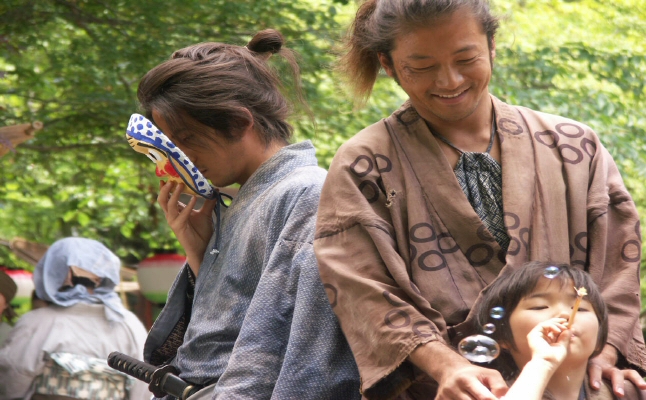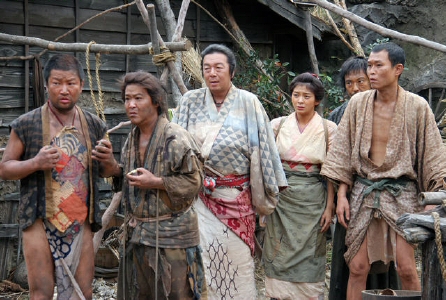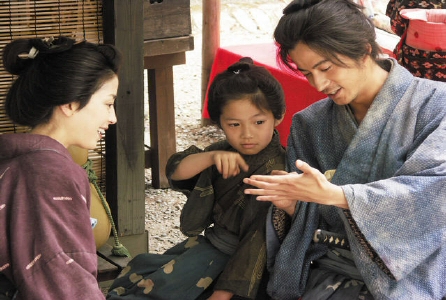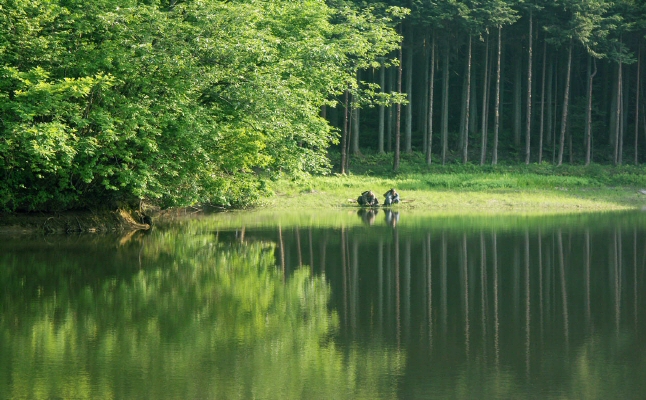
4/14/2007. hana: tale of the reluctant samurai

john cribbs
In October 2006, Funderburg and Cribbs set out to watch at least 200 movies over the course of the next 200 days. They both watched a different slate of films and wrote about every single one; from epic high art masterpieces such as Jean-Pierre Melvile's Army of Shadows to half-forgotten oddities like I Bury the Living to quality-deficient garbage like Charles Band's Tourist Trap. The Pink Smoke is reprinting their writings about the grueling experiment in cinematic endurance - due to the length of the essays, some of the entries such as Berlin Alexanderplatz and The War Lord will be broken out individually.
4.14. Hana: Tale of the Reluctant Samurai
What if, instead of becoming a wandering warrior who hits the road dueling with and ultimately maiming every brash challenger he crosses paths with, a masterless samurai ended up just hanging out in a small shanty feeling sorry for himself? What if being a ronin was really just a nice way of saying "unemployed?" And what if seeking vengeance for your father's death wasn't so much a personal quest as it was an imposition, just a constant reminder that you never lived up to the old man's expectations? Hirokazu Koreeda sets out to turn the jidageki on its head by answering these and other questions in his latest film, the genre-redefining and vaguely anachronistic-feeling Hana, the only movie you're likely to see where a fully-adorned samurai warrior stops on his way to the big final battle to tie his shoe. Of course, anybody who knows Koreeda's films After Life and Nobody Knows won't be surprised to hear that epic battles and duels aren't the kind of things he's interested in. He's more interested in humanity and personal connection - he's a love director, not a fight director. Mainly he wants to debunk the romantic legend of the shiftless samurai, although that theme's been run around the block in a number of classic Japanese films from Harakiri to Seven Samurai, and more recently in Yoji Yamada's thematically-linked trilogy starting with The Twilight Samurai, which I believe was released in the stateside as Family Man Samurai, and ending with Samurai Out on Work Disability, a.k.a. Love and Honor. So Koreeda gets marks for effort if not for originality.
 The director's liberal borrowing of theme and politics also extends to the setting and characters. The movie is placed entirely in a series of row houses similar to those in Yamanaka Sadao's Humanity and Paper Balloons. An addled fella jogs around mirroring the "conductor" in Dodes ka-den announcing "It's morning!" to the population, which includes a greedy landlord right out of The Lower Depths and bickering comedic peasants not unlike the two dimwits from The Hidden Fortress, complaining about the narrow space between shacks. But young, drifting samurai Soza is hardly a Kurosawa hero - he has trouble just closing the door of his hut. He's been tasked by his dying father to find his killer and avenge him, but he idles away time hanging out with a pretty, single mother and her eight-year-old son and teaching abacus lessons to the shanty youngsters. Although his resolve is absolute, he's clearly not into this murder business. Set during every Japanese director's favorite period, the reconstructive Tokugawa era, the film announces in a prologue that since the dismantling of local retainers, "incidents of bloodshed had blown out of fashion with the wind." So Soza finds himself torn between two worlds, one where violence and the purpose of the bushido in general is becoming increasingly devalued, and another represented by the surviving members of his former clan who insist he honor his father's wish and the proud traditions of the samurai warrior.
The director's liberal borrowing of theme and politics also extends to the setting and characters. The movie is placed entirely in a series of row houses similar to those in Yamanaka Sadao's Humanity and Paper Balloons. An addled fella jogs around mirroring the "conductor" in Dodes ka-den announcing "It's morning!" to the population, which includes a greedy landlord right out of The Lower Depths and bickering comedic peasants not unlike the two dimwits from The Hidden Fortress, complaining about the narrow space between shacks. But young, drifting samurai Soza is hardly a Kurosawa hero - he has trouble just closing the door of his hut. He's been tasked by his dying father to find his killer and avenge him, but he idles away time hanging out with a pretty, single mother and her eight-year-old son and teaching abacus lessons to the shanty youngsters. Although his resolve is absolute, he's clearly not into this murder business. Set during every Japanese director's favorite period, the reconstructive Tokugawa era, the film announces in a prologue that since the dismantling of local retainers, "incidents of bloodshed had blown out of fashion with the wind." So Soza finds himself torn between two worlds, one where violence and the purpose of the bushido in general is becoming increasingly devalued, and another represented by the surviving members of his former clan who insist he honor his father's wish and the proud traditions of the samurai warrior.
There are two notably weird things about Hana. The first is that the movie stars a dude from a popular Japanese boy band. To be fair, he makes for a handsome and appealing leading man, and besides isn't every huge Japanese star also a national pop sensation? Even co-star Tadanobu Asano (who received his first international notice appearing in Koreeda's Maboroshi) is a recording artist. The second is a background story that develops into the famous tale of the 47 Ronin, the country's most embellished and culturally significant legend that's been adapted into a film more times than Robin Hood (basic premise: corrupt court official unjustly forces a daimyo to commit seppuku, the feudal lord's former samurai form a plan over the course of a year to get revenge and ultimately stage a successful assault on the official's home, after which all forty-seven honorably kill themselves). But Koreeda is critical of the near-mythical bit of history, and parallels it to his story of a pacifist warrior to point out that loyalty and sacrifice are maybe not as important as being a good person, or at least that honor is a more loosely-defined term than feudal Japanese society acknowledged. Because the tale is so well known, it's really just hinted at in the narrative and therefore easily transplanted into the world of the film: I guess the American equivolent would be a western starring Justin Timberlake with a subplot where a bunch of guys are talking about going to defend "this fort down in Texas," except their courage and selflessness seems a lot like foolish pride - couldn't they just work out a deal with the Spanish army?
 Of course the actual assault on the official's home isn't shown (there's just a great-looking shot of the ronin rushing to their destiny), nor is there much action on display at all. I thought you couldn't downsize the action of a samurai movie any more than Twilight Samurai - two fights, one sword-less - but Koreeda proves that it's possible, showing only one sword-less fight that's more like scene where the bully teases the weak kid. The community has moved so quickly away from the idea of honorable sword battles that they melodramatic stage plays about them - "since there are no acts of vengeance," one guy explains, people understand the play is "half in jest." The popular concept of the noble samurai has completely vanished from the town and from the movie: it's revealed that Soza's father didn't even die in battle, he was killed in a fight over a board game. When Soza's sitting around minding his own business yet putting on an unquestionable air of superiority, a stinky drunk tells him "for someone who doesn't make nothing, you're sure proud of yourself!" Soza doesn't think much of it until a sober scrivener who witnessed the comment verifies its truth. In the movie's best line, the village idiot likens the supposedly-proud dying samurai to falling cherry blossoms: "Say, you think cherry blossoms fall so nobly because they know they'll blossom again next year? Otherwise, they wouldn't fall so readily." ("Hana," by the way, is means "flower" in Japanese). Pretty wise words from a guy who earlier in the movie got really excited watching another dude take a shit.
Of course the actual assault on the official's home isn't shown (there's just a great-looking shot of the ronin rushing to their destiny), nor is there much action on display at all. I thought you couldn't downsize the action of a samurai movie any more than Twilight Samurai - two fights, one sword-less - but Koreeda proves that it's possible, showing only one sword-less fight that's more like scene where the bully teases the weak kid. The community has moved so quickly away from the idea of honorable sword battles that they melodramatic stage plays about them - "since there are no acts of vengeance," one guy explains, people understand the play is "half in jest." The popular concept of the noble samurai has completely vanished from the town and from the movie: it's revealed that Soza's father didn't even die in battle, he was killed in a fight over a board game. When Soza's sitting around minding his own business yet putting on an unquestionable air of superiority, a stinky drunk tells him "for someone who doesn't make nothing, you're sure proud of yourself!" Soza doesn't think much of it until a sober scrivener who witnessed the comment verifies its truth. In the movie's best line, the village idiot likens the supposedly-proud dying samurai to falling cherry blossoms: "Say, you think cherry blossoms fall so nobly because they know they'll blossom again next year? Otherwise, they wouldn't fall so readily." ("Hana," by the way, is means "flower" in Japanese). Pretty wise words from a guy who earlier in the movie got really excited watching another dude take a shit.
As was the problem with After Life [which I realize now is overdue for a Second Chances column -- john] the movie kind of loses focus towards the end. Koreeda abandons some interesting observational camerawork for one or two obvious narrative ploys. For example, just as the community is coming together, the landlord announces he's demolishing the shacks and everyone has to leave. I think making Soza a weak, unskilled samurai is a bit of a cop-out: isn't the point that he simply doesn't want to kill Tadanobu Asano, not that he's worried he'll die in the ensuing duel? I guess the point is that either outcome sucks, but it felt like an unnecessary addition to the character to make him a poor swordsman. Koreeda's recurring theme of obligation, especially to dead people - to avenge the father, to honor the memory of a possibly-suicided husband (Maborosi), to understand family members who killed themselves in a cult suicide (Distance), [2010 update: to attend an annual dinner to honor the death of a beloved son (Still Walking)] - is always in the foreground in Hana, but sometimes the more interesting themes get bogged down by the big production*. Those are just minor complaints - I liked the movie. But while it was more thoughtful and (shockingly) restrained than Twilight Samurai, I kept thinking it was something of an afterthought or comment on Yamada's superior film.
Another moment I really liked in the movie was when Soza hatches his ultimate plan to fool his fellow masterless clan members into believing he avenged his father: he sets the whole thing up like another play, and offers the village dummy the lead role. The face of the guy made me think of that great bit towards the end of Rushmore with Magnus Buchan: "I always wanted ta be in one o' yr fockin plays!"

* I should clarify that: Koreeda's aesthetic and design are so stripped-down that the period stuff is genuinely distracting here, just as the fantasy elements were distracting in his most recent movie Air Doll. -- 2010 John
home about contact us featured writings years in review film productions
All rights reserved The Pink Smoke © 2010